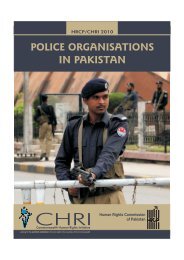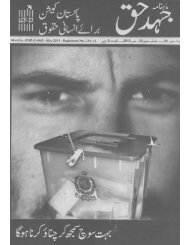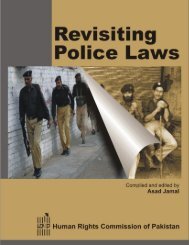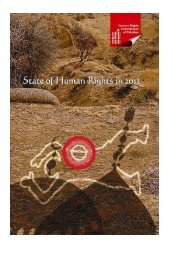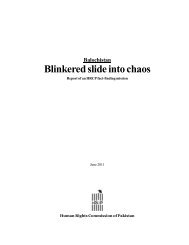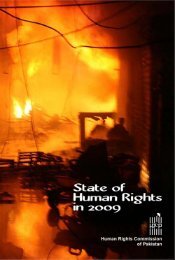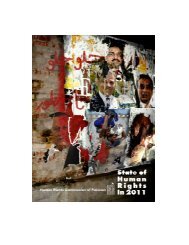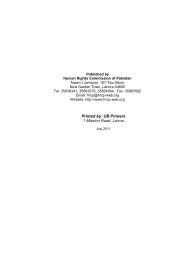Download PDF file - HRCP
Download PDF file - HRCP
Download PDF file - HRCP
You also want an ePaper? Increase the reach of your titles
YUMPU automatically turns print PDFs into web optimized ePapers that Google loves.
<strong>HRCP</strong> fact-finding missions’ report 65<br />
Concerns in Gwadar<br />
The Gwadar mega-development project was one of the most significant causes of public agitation in Balochistan<br />
in the Autumn of 2003. The main grounds of criticism that the <strong>HRCP</strong> mission heard were: exclusion of the people and<br />
their representatives from the planning and execution of the project, irregularities in settlement of land titles, landgrabbing<br />
by outsiders, neglect of the traditional interests of the fishing community, indifference to the rights of the<br />
people threatened with displacement, inadequate representation of the local people in the new work-force, and the<br />
local community’s fears of being swamped by settlers from other parts of the country. Those who rejected this<br />
criticism argued that some price had, after all, to be paid for development. They further accused the critics of being<br />
opposed to development. The latter assertion was vigorously repudiated by all the people <strong>HRCP</strong> met.<br />
While much of what has been said about Turbat, Khuzdar, and Loralai in the earlier part of this report applies to<br />
Gwadar too, the port city presented quite a few problems peculiar to it. Hence, <strong>HRCP</strong> has decided to add a separate<br />
chapter on the Gwadar issues.<br />
Hafiz Husain Ahmad, MNA and an important MMA leader, said everybody in Balochistan was interested in the<br />
development of Pakistan and Balochistan. Thus, no-one could take exception to development plans for Gwadar.<br />
However, in the past Gwadar had attracted speculators and exploiters. The way lands were grabbed and settlements<br />
planned aroused serious misgivings. Many people had bought land for peanuts and were now selling it at the price of<br />
gold. MMA had therefore directed the Local Government Minister to cancel the allotment of plots, especially those<br />
falling under the Singhar scheme. There were also fears that the local population would be turned into a minority. The<br />
Balochistan Governor was replaced because he had opposed the grabbing of Gwadar resources. The MMA wanted<br />
that primacy be attached to the interests of the people of Gwadar and the Mekran coast just as it wanted the interest<br />
of the Chaghi people protected under the Saindak project. As a matter of principle, all mega-projects in Balochistan<br />
must be under the control of Balochistan’s representatives.<br />
Hafiz Husain Ahmad also emphasised the need for protecting the rights of Gwadar’s fisher-folk. They had been<br />
struggling against heavy odds for a long time and it would be wrong to ignore their interests. They should be provided<br />
with modern fishing equipment. They needed modern boats so that they could compete with foreign entrepreneurs<br />
who used modern trawlers. Greater attention needed to be given to prawn export. The MMA leader pointed out that<br />
the Gwadar project also touched on the issue of provincial autonomy.<br />
Mr. Abdur Rahim Zafar, a businessman, told the <strong>HRCP</strong> team that the Chinese construction company working<br />
on the Gwadar port had recruited 400 workers and out of them only 30 or so belonged to the local community. The<br />
settlement authorities had committed gross irregularities in determining land titles. The Gwadar Master Plan covered<br />
a 12-kilometer strip from the port to the airport but it was not clear as to how the land was to be secured. The land<br />
prices had sky-rocketed. When the Singhar scheme was launched in 1990 the price of a 500-yard plot was Rs. 500<br />
but it soared to Rs. 2,500,000 and had only come down to Rs. 1,500,000 after the start of a probe by the provincial<br />
government.<br />
At a meeting of citizens at the Rural Community Centre, several participants told the <strong>HRCP</strong> team of their concerns<br />
over the disposal of land. Mr Nasir Baloch alleged that the Settlement Department had recorded land titles under<br />
benami system. A large number of new landowners did not belong to Gwadar. They included politicians, bureaucrats<br />
and businessmen from other parts of the country. The people of Gwadar had protested and called upon the government<br />
to publish the list of landowners. But this had not been done.<br />
Mr Mujibur Rahman, Advocate, said he was appearing in three cases in which local people had sought reversal<br />
of fraudulent entries of their lands in other people’s names. The staff of the Additional Sessions Judge had arrived in<br />
Gwadar but no building for his court was available. As a result the litigants had to go to Turbat, 200 kilometers away.<br />
He said that as the settlement record was inaccessible to the people, a large number of people did not know that their<br />
lands had been transferred to other people (by officials who took bribes).<br />
The <strong>HRCP</strong> team called upon the Gwadar EDO (Revenue), Mr Abdul Hafeez Hote to ascertain his views on



